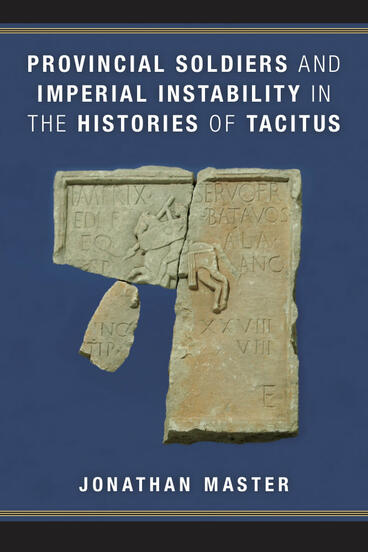Provincial Soldiers and Imperial Instability in the Histories of Tacitus
Considers what Tacitus’ presentation of provincial soldiers was intended to teach Roman imperial readers
Description
Tacitus’ narrative of 69 CE, the year of the four emperors, is famous for its description of a series of coups that sees one man after another crowned. Many scholars seem to read Tacitus as though he wrote only about the constricted world of imperial Rome and the machinations of emperors, courtiers, and victims of the principate; even recent work on the Histories either passes over or lightly touches upon civil unrest and revolts in the provinces. In Provincial Soldiers and Imperial Instability in the Histories of Tacitus, Jonathan Master looks beyond imperial politics and finds threats to the Empire’s stability among unassimilated foreign subjects who were made to fight in the Roman army.
Master draws on scholarship in political theory, Latin historiography, Roman history, and ethnic identity to demonstrate how Tacitus presented to his contemporary audience in Trajanic Rome the dangerous consequences of the city’s failure to reward and incorporate its provincial subjects. Master argues that Tacitus’ presentation of the Vitellian and Flavian armies, and especially the Batavian auxiliary soldiers, reflects a central lesson of the Histories: the Empire’s exploitation of provincial manpower (increasingly the majority of all soldiers under Roman banners) while offering little in return, set the stage for civil wars and ultimately the separatist Batavian revolt.
Jonathan Master is Associate Professor of Classics at Emory University.
Reviews
“Beyond the specific arguments about the Batavian revolt, this will reinvigorate scholarship on Tacitus and offer the possibility of a Tacitus who is not just a grim pessimist, but one who is genuinely engaged in a didactic discourse proper to history, where readers can find the incentive to construct optimistic as well as ironizing interpretations.”
—Edward Bispham, Brasenose College, Oxford University
"In short, Master has produced a tremendously enjoyable book, which has much to say to historians of Rome and Roman historiographers alike."
- RHIANNON ASH
--Rhiannon Ash, The Classical Review
"This comprehensive reevaluation of the historicity and literariness of the Histories has stimulated new interest in this work, and it deserves high approbation from all Tacitean enthusiasts."
- Eleni Manolaraki
--Classical Philology
"Very thorough, lucid interpretations,which fit into a coherent overall picture."
- Bonner Jahrbücher
--Bonner Jahrbücher

